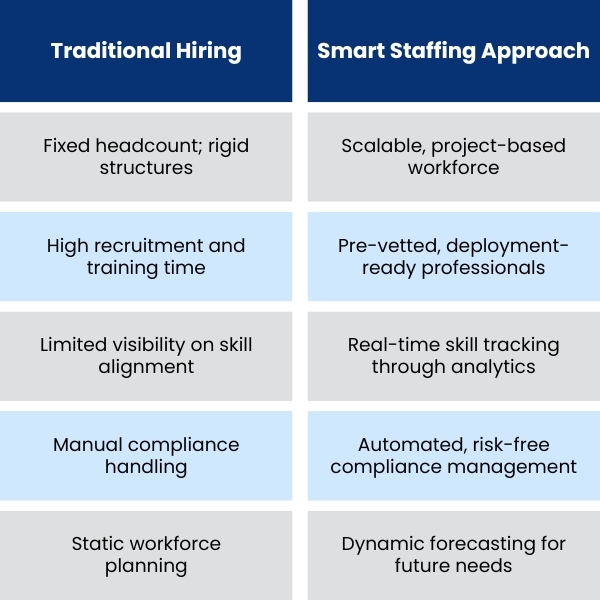Introduction: The Paradox of India’s Talent Boom
India is often described as the world’s talent powerhouse. Yet, as we enter 2025, industries are facing an uncomfortable truth — a growing skill shortage. From renewable energy projects to pharmaceutical R&D and oil & gas operations, organizations are struggling to find the right expertise at the right time.
Despite a large workforce, there’s a widening gap between available talent and industry-ready skills. The result? Delayed projects, overworked teams, and lost productivity. This is where smart staffing strategies are changing the equation — helping companies meet demand efficiently, without compromising quality.
The Skill Gap in India: What’s Causing It?
1. Rapid Technological Change
Automation, AI, and digital tools are transforming job roles faster than training systems can adapt. Many mid-level workers lack the new-age technical proficiency required in 2025’s hybrid work environments.
2. Industry-Specific Talent Gaps
Sectors like oil & gas, renewable energy, pharma, and manufacturing require specialized skill sets — QA/QC, safety, design, data analytics, and process engineering — that aren’t easily found in large numbers.
3. Urban-Rural Workforce Divide
While urban areas are saturated with graduates, project sites in Tier-2 and Tier-3 locations face shortages of trained technical staff. This imbalance slows project execution.
4. Employee Mobility & Retention Challenges
High attrition rates in contract-based roles and limited long-term growth opportunities mean industries are constantly training replacements.
What Is “Smart Staffing”?
“Smart staffing” goes beyond just filling vacancies. It’s a data-driven, flexible, and skill-aligned approach to workforce management. It integrates three key pillars:
1. Agility – The ability to scale manpower up or down quickly.
2. Expertise – Access to pre-vetted, trained professionals.
3.Efficiency – Leveraging technology to match roles with the right talent instantly.
Through contract staffing, workforce analytics, and HR outsourcing, companies can now forecast needs, minimize downtime, and ensure projects remain on schedule.
How Indian Industries Are Adapting
1. Contract Staffing for Specialized Projects
Industries like oil & gas and renewables are embracing project-based staffing models. Instead of maintaining large permanent teams, they deploy contract engineers and specialists through trusted partners like Induspect — ensuring both skill fit and cost control.
2. Workforce Outsourcing for Agility
By outsourcing HR and administrative processes, organizations free up internal bandwidth while ensuring statutory compliance. This allows leadership to focus on innovation and delivery instead of hiring logistics.
3. Collaboration with Technical Institutes
Progressive companies are partnering with polytechnics, ITIs, and universities to train fresh graduates for industry-specific roles. This creates a talent pipeline aligned with real project needs.
4. Skill Mapping & Analytics
Modern HR outsourcing solutions use AI-driven analytics to map workforce skills, predict shortages, and deploy suitable talent proactively. This prevents last-minute firefighting during critical project phases.
Why Smart Staffing Works Better Than Traditional Hiring

Smart staffing transforms recruitment from a reactive process into a strategic advantage.
Case Example: Bridging the Gap in Renewable Energy
A leading renewable energy EPC company faced recurring project delays due to skilled manpower shortages at remote sites. By partnering with Induspect for contract staffing and workforce management:
- 80+ skilled technicians were deployed within 21 days.
- On-site training programs improved retention by 35%.
- Compliance and payroll were handled seamlessly across 3 states.
The result? Timely project completion and reduced overtime costs — proving that smart staffing can bridge skill gaps efficiently.
The Role of HR Outsourcing in Closing Skill Gaps
Smart staffing doesn’t work in isolation. It’s powered by robust HR outsourcing frameworks that ensure:
- Continuous workforce upskilling through training tie-ups.
- End-to-end compliance under India’s evolving labour laws.
- Transparent payroll and performance analytics.
- Employee well-being programs that enhance retention.
With partners like Induspect, companies can achieve both operational excellence and workforce resilience.
Action Plan for Employers: Adapting to the 2025 Workforce Reality
✔️ Audit current skills and forecast gaps for the next 12 months.
✔️ Adopt a blended model — mix permanent, contract, and outsourced talent.
✔️ Use technology tools for workforce analytics and deployment tracking.
✔️ Build partnerships with compliant staffing agencies.
✔️ Focus on upskilling as a retention strategy, not just hiring replacement.
Conclusion: From Shortage to Strategy
The skill shortage challenge is not a roadblock — it’s a turning point. Indian industries that embrace smart staffing will unlock faster execution, higher efficiency, and sustainable growth.
As 2025 unfolds, organizations need more than manpower — they need the right people, at the right time, under the right framework. And that’s where Induspect steps in — as a partner in building agile, future-ready teams.
To discover how our contract staffing and HR outsourcing solutions can help your organization close skill gaps and stay ahead in 2025.

-1.png?width=1160&name=Induspect%20blog%20images%20(3)-1.png)
